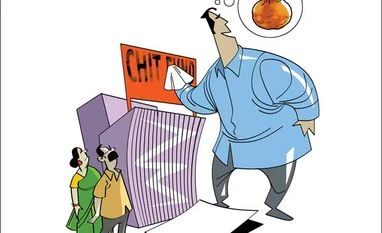The Union Cabinet, chaired by the Prime Minister, approved the introduction of the Chit Funds (Amendment) Bill, 2018 in Parliament on Tuesday. The Bill seeks to facilitate orderly growth of the chit fund sector and remove bottlenecks faced by the industry, thereby enabling greater financial access of people to other financial products.
T S Sivaramakrishnan, General Secretary, All India Association of Chit Funds, and director of The Balussery Benefit Chit Fund said that the whole idea of introducing a new Bill was to bring unorganised chit companies or individuals into the organised net.
"Our Association is of the considered view that proposed amendment will not be able to bring in the desired investor protection measures badly needed to safeguard the public money," said Sivaramakrishnan.
The main requirement was to reduce the security to be deposited with the Registrar under Sec 20 (1) to 50 per cent of the chit value, that too at the time of commencement, which has been addressed in the proposal. Though it was approved by the key advisory group formed by the Department of Financial Services (DFS), the proposal has been dropped without any reasoning, he said.
"The Group has also suggested to bring in insurance coverage for the subscriber money in the hands of the Chit foreman. Though some lead in this regard could have been given in the proposal, it has been omitted conveniently, for reasons best known to them," he added. He said that the organisation is planning to insist on referring the Bill to a select committee when it is tabled in the Parliament, so that it is examined in detail.
Sivaramakrishnan claims that registered number of chit firms in India is around 30,000 units, while the number of companies has not increased, the value has crossed Rs 500 billion already.
The unorganised would be nearly 100 times in terms of volume, though people might think that the numbers are simply exhoribant. The legislation should be unfriendly to the unorganised sector, and be in tune with the ongoing liberalisation programs, so that the unregistered ones can be persuaded to the registered segment.
The suggestions by the industry include improving financial literacy, to help the consumers differentiate organised and unorganised players, insurance policy for the subscribers, self regulatory authority, rating mechanism, grievances redressel cell and others.
"The amendment bill was supposed to control the undergistered sector, but it is not helpful in doing so in the current form. Investor protection is very important, financial literacy is not there,"he added.
Some of the amendments proposed include use of the words "Fraternity Fund" for chit business under various sections of the Chit Funds Act, 1982, to signify its inherent nature, and distinguish its working from "Prize Chits" which are banned under a separate legislation, according to a statement by the central government.
The Bill also said while retaining the requirement of a minimum of two subscribers for the conduct of the draw of the Chit and for the preparation of the minutes of the proceedings, the Chit Funds (Amendment) Bill, 2018 proposes to allow the two minimum required subscribers to join through video conferencing duly recorded by the foreman, as physical presence of the subscribers towards the final stages of a Chit may not be forthcoming easily.
The bill proposed to increase the ceiling of foreman's commission from a maximum of 5 per cent to 7 per cent, as the rate has remained static since the commencement of the Act, for over three decades, while overheads and other costs have increased manifold.
To read the full story, Subscribe Now at just Rs 249 a month
Already a subscriber? Log in
Subscribe To BS Premium
₹249
Renews automatically
₹1699₹1999
Opt for auto renewal and save Rs. 300 Renews automatically
₹1999
What you get on BS Premium?
-
Unlock 30+ premium stories daily hand-picked by our editors, across devices on browser and app.
-
Pick your favourite companies, get a daily email with all news updates on them.
Full access to our intuitive epaper - clip, save, share articles from any device; newspaper archives from 2006.
Preferential invites to Business Standard events.
Curated newsletters on markets, personal finance, policy & politics, start-ups, technology, and more.
Need More Information - write to us at assist@bsmail.in



)